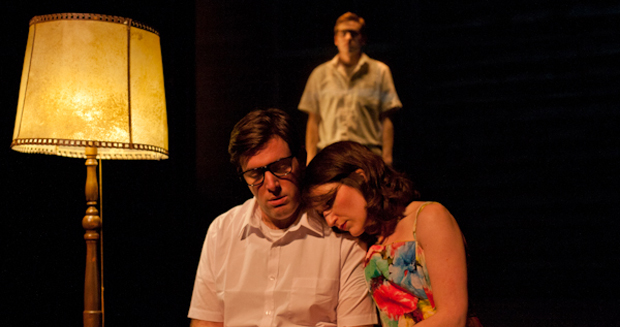Showing @ Traverse Theatre, Edinburgh until Sat 31 Mar – run ended
Medical progress has a long and dark history of unethical, risky testing on humans. When yielding positive results, such as when Jenner invented the smallpox vaccine by administering the far milder cowpox (vacca is Latin for cow), this history is to some extent overlooked. But it’s almost impossible to reconcile those rare successes with the devastating effects of the experiments from the fifties and sixties. And it is this sinister side of medical trial and error which high-powered young company, Analogue, tackle in their latest play.
Capitalising on the reputation garnered from their previous projects Mile End (2007) and Beachy Head (2009), Hannah Barker and Liam Jarvis’s most recent venture is based on the true story of Henry Molaison, a young man suffering from an incapacitating form of epilepsy who makes the drastic decision to undergo experimental surgery to ease his seizures. Having had some success with partial removal of both hippocampi, Dr Scoville boldly (and blindly) decides to remove them entirely. From 1953 onward, Molaison would be unable to generate any new memories. He would also become the most studied amnesiac in history.
The three cast members deal remarkably well with multi-role performance, as Paul Hassall and Simon Yadoo share Molaison’s character between them (Hassall as the young Henry and Yadoo as the post-op Patient HM). Alexandra Maher also touchingly portrays the mixture of frustration and heartbreaking pity of Patient HM’s long-term nurse (just one of her three characters) who is never remembered. Yet the most impressive aspect of this play is the way in which the cast utilise their innovative set.
Based on the cryomicrotome used to dissect Molaison’s brain in 2009 (in front of a 400,000 strong online audience) Analogue created a large gauze projection screen which can move up and down the stage, consuming prostrate actors and revealing set changes. The operation sequence, with Henry desperately trying to cling on to the memories of loved ones as they are pulled beneath the screen into darkness, is both more haunting and emotionally affecting than any of the scenes with dialogue. It also induces a repugnancy towards a time when wiggling an ice-pick around inside someone’s skull was considered standard practice. Yet this makes it all the more baffling when almost the only comment made on Dr Scoville is ‘he liked fast cars’. This ambivalent, Clarkson-esque defence really draws attention to the fact that there is next to no exploration of the man who destroyed Molaison’s memories. This absence aside however, 2401 Objects is an impressive and adventurous piece of theatre which more than merited its Fringe First award at last year’s Festival.


Comments